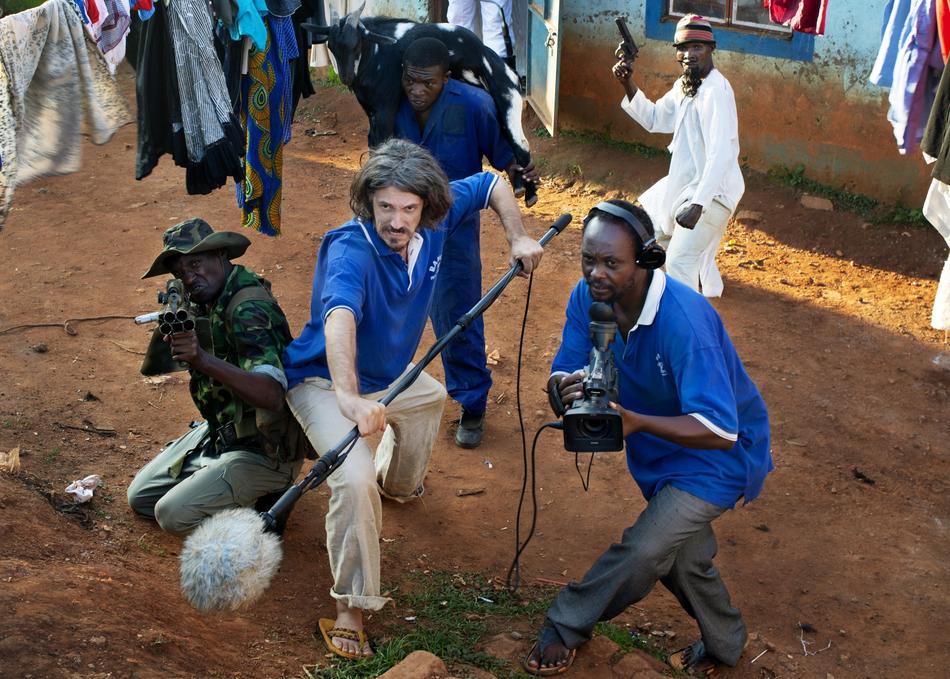
Until last year, Isaac Nabwana Godfrey had never been in a movie theatre.
That might seem super counterintuitive considering that Nabwana is a filmmaker. But, truth be told, lots of things about Nabwana are a bit strange — and he wouldn’t have it any other way.
Nabwana, 47, is a self-taught, DIY filmmaker who owns and operates Ramon Film Productions — AKA Wakaliwood, a mini-studio that specializes in action movies. They’re located in (and take their name from) Wakaliga, a slum outside of Kampala, Uganda, where Nabwana was born and raised. They’ve become an internet sensation within the past decade thanks to their crazy, bizarre action films, which feature over-the-top violence, endearingly cheap visual effects and loads of fun.

Nabwana’s parents died young, and he and his brother were raised primarily by their grandmothers, Rachel and Monica, who later provided the inspiration for the Ramon Film Productions name. As a kid, Nabwana and his brother would sneak into cinema halls in the city and watch Arnold Schwarzenegger and Chuck Norris blockbusters, as well as kung fu movies. Since Uganda didn’t have a ratings system, children were banned from theatres due to fears of sex and violence, and with no local film industry, the only movies to watch were imported action flicks. But Nabwana couldn’t get enough of them.
![People watching Ivory Trap, a film by Isaac Nabwana, at the evening show. [Stefano Schirato/Al Jazeera]](https://www.aljazeera.com/wp-content/uploads/2018/03/27acdd5fd893464bacece09eeeeba8f1_8.jpeg?fit=1170%2C780)
By the time he was an adult, Nabwana was getting by on various jobs like teaching at his local primary school or making and selling bricks to his neighbors. He enrolled in a computer course, but could only take one term before he ran out of money.
At age 32, Nabwana decided to pursue filmmaking, recruiting friends and family from around his village to make the most intense, super action movies ever. Fueled by a mixture of adrenaline and raw enthusiasm, Nabwana made films. Lots of them. He saved up enough money to buy a used HD video camera. He trained people how to run sound. He edited the movies himself and developed visual effects skills, learning by simple trial and error. Wakaliwood’s propmasters, led by Dauda Bisaso, combed through piles of scrap metal to create jibs and cranes for the camera equipment, in addition to prop guns and bullets.
By his own admission, Nabwana has made over 40 movies, many of which are lost in cyberspace, because he simply doesn’t have enough room on his self-assembled computer to hold all the files. Out of practicalities, Nabwana has converted part of his house into a sound recording booth and a costume closet. Oh, and Wakaliga gets only a few days’ worth of electricity per week.

Then the fun part: distribution.
In Uganda, film piracy is rampant, and there’s no film distribution network, so there’s a finite amount of time to get the word out. Nabwana, helped by his family, package and assemble the DVDs themselves. Helped by his small army of actors, crew and stuntmen, Nabwana would, for many years, go door-to-door with his actors, selling their movies in person for the price of 2500 Ugandan shillings (that’s about 90 cents USD), which is usually more than pirated copies of major Hollywood blockbusters like The Avengers or Jurassic World. Half the profit would go to the actors — who frequently sold the DVDs in costume — and half would go back into the studio itself.
The icing on the cake for any Wakaliwood film is the inclusion of VJ Emmie. In Uganda, VJs (short for “video joker”) provide English language commentary on films and pepper them with jokes. Emmie himself serves as a hype man for Wakaliwood films, while also making one-liners about American action stars, plus tongue-in-cheek quips about how cheap the end product is. The self-awareness is genuinely funny and charming and shows how, even with extremely limited resources, these are passionate film people with amazing wit and humor.

Eventually, Nabwana found an unlikely kindred spirit: Alan Hofmanis, former director of the Lake Placid Film Festival in New York.
Hofmanis was in some pretty dire straits back in 2011. He had just bought an engagement ring for his girlfriend — only for her to break up with him the very next day. One of Hofmanis’s friends invited him to a bar to cheer him up. While there, he showed Hofmanis the trailer for Wakaliwood’s Who Killed Captain Alex? After only 90 seconds, Hofmanis was astonished. Then and there, he packed his bags, rented a storage unit, and moved to Uganda to be a part of the action.
“I realized that nothing I was watching made sense, but it was completely brilliant,” Hofmanis says. “In America, if you have no money, you shoot a two-minute scene of two people talking. You don’t make a war movie.”
Hofmanis introduced himself to Nabwana and they became fast friends. Hofmanis has since become Wakaliwood’s international liaison and executive producer. He’s not afraid to get in front of the camera either, playing a supporting role in Bad Black, which came out in 2016 (He’s since changed his stage name to Alan Ssali, as “Hofmanis” bears an unfortunate resemblance to an obscenity in the Luganda language!).
“Their passion oozes out of their films in a way you couldn’t manufacture even if you tried,” says Alex Ferrari from Indie Film Hustle, who did a podcast interview and profile of Nabwana and Wakaliwood in 2015. “With all the opportunities and technology we in the United States take for granted, he created an entire film industry with basically string and tape.”
Nabwana understands the position he’s in. He’s been profiled by Vice, The Washington Post, The Guardian, and Al-Jazeera, but his main heart lies in continuing to churn out micro-budget features. In a 2015 Kickstarter video with Hofmanis, Nabwana humbly asked for $160 USD in order to make a new feature. He reached 8000% of his goal — over $13,000!
“Movies should rarely be defined by the context in which they’re made — except when that context means everything,” says Film Critic Hulk, a reviewer from BirthMoviesDeath.com. “Isaac makes passionate, VFX-filled action genre films, and he does so in the exact same way that a lot of kids make films in their own backyard.”
When they aren’t shooting, Nabwana and his crew still find time to rehearse twice a week and build newer and bigger props. Wakaliwood actor Charles Bunkenya operates a martial arts studio in the slum where he teaches the local kids kung-fu. Some of them got a chance to show off their skills in the 2019 film Crazy World, which got a fancy premiere at Toronto International Film Festival — which, again, was the first time Nabwana had ever been inside a real movie theatre.
Back in his home country, Nabwana is alternately excited and frustrated with the level of support. The word has still been slow to get out, despite Wakaliwood’s best efforts. In a country divided by linguistic lines, it’s difficult to gain exposure into the northern regions of Uganda, where Luganda isn’t spoken. In a local TV interview in 2013, Nabwana noted the success of countries — like the US or Ireland — that provide tax incentives for filmmaking. Nabwana lamented that the Ugandan government is short-sighted and does not see the potential for job creation that filmmaking brings. He and Hofmanis sometimes clash over the direction of where Wakaliwood should go — Hofmanis sees all the international potential that the studio has and wants to take full advantage of it, whereas Nabwana doesn’t want to lose the unique “by the slum, for the slum” voice that Wakaliwood possesses.
But Nabwana, ever the optimist, knows that there’s more work to be done, and he’s more than happy to let his family in on the action as well. His wife, Harriet, is the official bookkeeper at Ramon Film Productions, and his son, Isaac Newton, has co-starred in several movies already. Statistically speaking, Uganda is the youngest country on Earth (average age: 15), and Nabwana dreams of establishing an official film school to train the next generation of Ugandan filmmakers.
I’ve been lucky enough to see quite a few Wakaliwood films, and I proudly own the DVD-BluRay combo pack of Who Killed Captain Alex? and Bad Black. I previously reviewed Captain Alex on this blog, and I mentioned how the film became an internet classic and first gave Wakaliwood significant international exposure. The film is just so crazy and goofy, that you can’t help but love it, no matter how amateurish the production may be.

When I purchased the combo pack on the Wakaliwood website (only $20!), I received a shipment addressed to “Commando Frederick” plus two bumper stickers, two sewn-on Wakaliwood patches, a black Wakaliwood t-shirt and even a personalized message:
Thank u so much for purchasing our t-shirt and 4 supporting Wakaliwood. We make the shirts ourselves and maybe u will see that the image is crooked, or some paint drip on sleeve. We are not perfect, but try very hard. Please enjoy knowing we made this shirt for you.
“Wakaliwood understands what is charming about the low-rent stylings, what’s legitimately funny or good about what’s on screen, and also what is truly great about the genre they are aping,” says Film Critic Hulk. “Put simply: these filmmakers are deeply aware of what they’re making.”

To date, Nabwana still gets phone calls from fans in places such as Denmark, Finland and Japan. He and Wakaliwood were recently featured in a documentary called Once Upon a Time in Uganda, which profiles the amazing work he’s done so far and the plans that they have for future growth of the studio. On the DVD-BluRay that I own, there are fan-made videos of Captain Alex in anime format, or parodies of the film in French or Russian.
Make no mistake, Nabwana has come a long way from Captain Alex, where a prologue stated that he “never imagined anyone outside his village would ever see the film.”
Wakaliwood isn’t just popular as an ironic internet meme or as a one-off novelty. People love these corny, ridiculous action movies because they’re made out of a pure desire to entertain. These guys work with their limitations instead of being restricted by them.
And it’s all thanks to a filmmaker who hadn’t even been in a movie theatre before.